#standard issue priest
Explore tagged Tumblr posts
Text
CW/TW: assault, implied dubcon, hierophilia.
In one panel a character is called 'my child'. 'My child' is only used as a term of endearment because one of the characters (Luciana) is older and is in a higher position, but all the characters in this are adults. Just letting everyone know before anyone says anything.
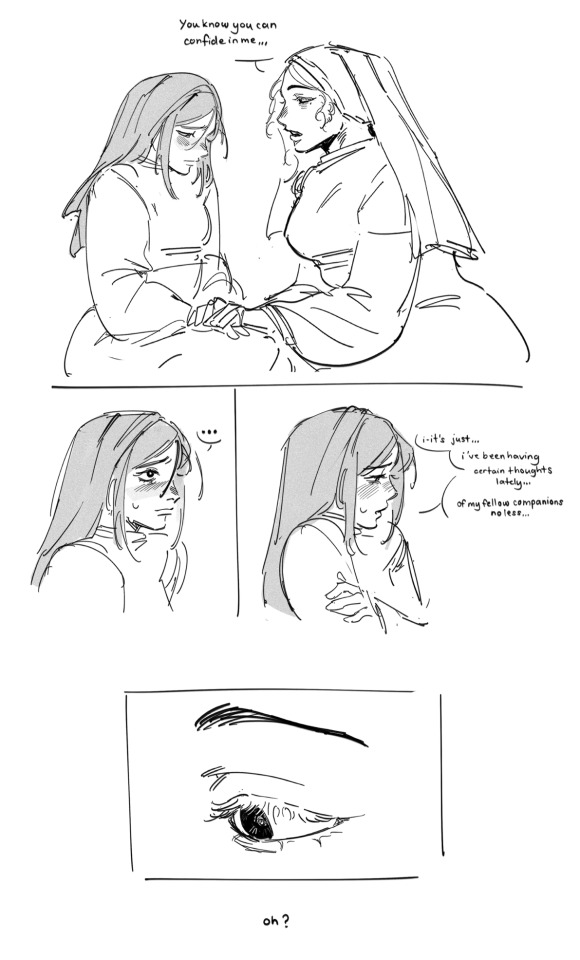
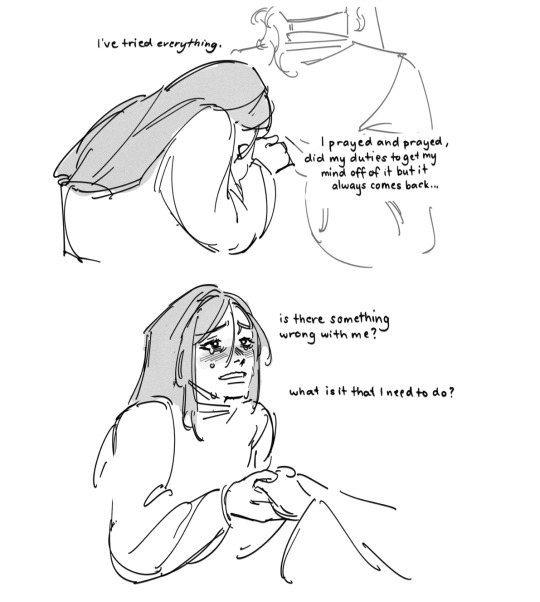
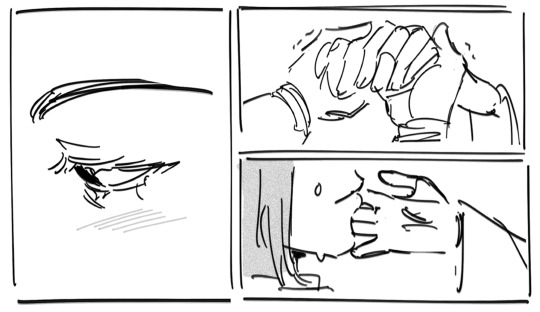




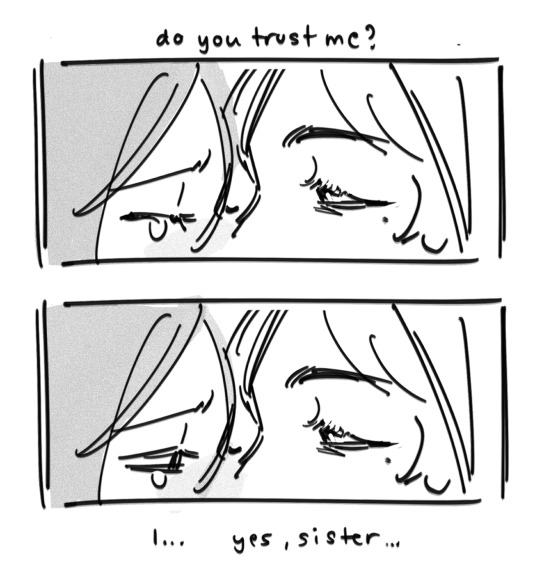
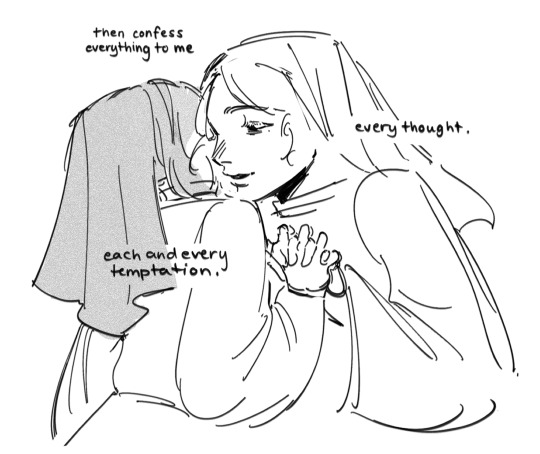
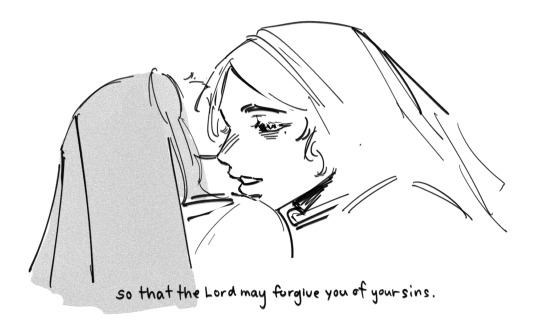
#it was supposed to be just nun doing shit but it turned into a whole comic whoops#its not anything too wild bc thats for part 2 :3#and of course theres the standard issue oc that is suspiciously similar to the artist#this is protocol atp#will do a priest next 🫡 bc i believe in equality#as in both nuns and priests should both be equally sexualized bc my perversion knows no bounds#then a 3p because i love being bi#my art#tw assault#tw dubcon#tw hierophilia
2K notes
·
View notes
Text

#ryuji suguro#ao no exorcist#blue exorcist#ryuuji suguro#suguro ryuuji#bon suguro#suguro ryuji#manga ryuuji#it seems a few people get confused at what this scene is saying#tatsuma isn't saying ryuuji is mean or cruel#rather that his expectations and standards have always been strict#he holds himself to nearly impossible standards#and that he expected those high standards to be met by others as well#especially his father who has not met any of his expectations in a long time#i would also like to point out to tatsuma that this is the first time we've seen him let ryuuji help#and the first time we've seen him taking on and performing part of the job of being the high priest of the myodha#it seems far too often#to me#that everyone looks at Ryuuji as being wrong in all of this and how he handled it#but tatsuma was the one to push him away first#to make him choose between the myodha and everything else#especially tatsuma and the myodha#and from what we've seen of their relationship#ryuuji wasn't unwilling to help him in the job or to support him in it#rather we see tatsuma pushing him away or denying him access to it once true cross entered the picture#and then being absent from the job itself#their conversations never feel quite finished#and never feel quite like they ever address the lopsided dynamic#tatsuma can come across as dismissive of all the issues ryuuji had#and there's never anything like an apology between them
12 notes
·
View notes
Text
Child of Time | DC X DP
Thanks for almost 100 followers LMAO originally I had a gala idea for when I hit 50 followers and then I disliked it so here's this instead. it's not up to my standards but what can i do when i'm on like 2 hours of sleep. (_ _)。゜zzZ
i like the idea of constantine being absolutely disgusting to look and feel to danny
☁️☁️☁️☁️
“I know what Clockwork really wants, he wants to me to kill my motherfucking self. That’s why he fucks with me. That’s why he gave me a fucked up ass life!” Danny shouted as he closed the flap of his tent to give himself a semblance of privacy because he’d been kidnapped by a cult who said that he’d be their priest because he’s the child of Time.
The only time that he knows is the time when he fucking decks Clockwork next time he sees the old bastard.
“But jokes on him, I ain’t going to give that motherfucker the satisfaction.”
Danny took off the cloak that the cultists forced him into and threw it on the chair in his tent, his head throbbed and it reminded him of the fact he’s had that headache for a while now. It’s probably because he hadn’t gone ghost like he usually does, he didn’t want to risk it when these cultists were keeping an eye on him. It really annoyed him.
He took a deep breath as he calmed himself, well calmed himself as good as he could when he has very much unregistered anger issues because he had been in the middle of a project when he had been taken. If he came back to the room ransacked because the Bat brood couldn't keep things clean he's going to fucking snap.
He was a teenage vigilante, he was bound to get anger issues later considering the fact that the GIW was still around and even Danny couldn't go as ghost as often as he wished and was only lucky when Gotham's abiment ecto was high enough to mask it.
The height of his anger was when one John Constantine walked into Danny's life and instantly it was on sight whenever the two interacted because John's soul was DISGUSTING and he'd die (again) on that hill. Especially when the man summoned Danny one time and Danny still gets sick whenever he thinks about the missing parts of John's soul in his magic, of the gaps that dig their claws in Danny's very being. How it felt like he was digging through sludge that dragged him down everytime.
The menace of Danny's major problems walked in, instantly Danny's nose crinkled in disgust at the smell of cigarettes as he tuck a strand behind his ear.
"John?"
"Kid, you need to stop allowing this to happen. I didn't need Wonder Woman on my arse because your ghostly father was pestering her about you being taken."
Danny supressed the urge to laugh rather hysterically because he doesn't need people to remind him that Clockwork is basically his dad in the ghost aspect of things because he basically called dibs.
"Why didn't you leave?"
"Got taken as human, in front of many people. In Gotham. Tell your batty paramour I'm fine."
John choked on his cigarette as he protested about Batman being his paramour but Danny knew that they were AT LEAST tumbling in bed because why else did Danny have the attention of the Bat Brood and it WASN'T because he was prime adoption bait no matter what his classmates said. Nor was it the fact that he accidentally punched Red Hood one time because the revnant decided to sneak up on him one day when he was walking home. Didn't even hear what the man said, just fucking bolted.
"Let's just go, you little brat. I can't believe I let your sister talk me into being your knight." John mumbled as Danny stood next to John while the man grabbed the back of Danny's shirt like he was-
"Are you fucking scruffing me?"
“Have been for the past few years mate.”
#dc x dp#danny fenton#danny phantom#dc comics#dc universe#dc x dp au#dc x dp crossover#dc x dp prompt#dcu#john constantine#hellblazer
558 notes
·
View notes
Text
hey so a little while ago I decided this would be a fun thing to make, and now 3 days and many, many hours later, I have it complete, and I would like to share it! So, here is:
Questions to ask yourself when creating / studying / writing about, etc a culture (fantasy or real)
I absolutely love creating my own fantasy worlds, and recently I have been looking at advice on how to do it better, but none of the posts I’ve found are quite thorough enough for me. So, I decided it would be fun to make my own list of what questions you should ask yourself when making a fantasy culture!!
This will certainly not be all-encompassing, and I am by no means an expert on any of this, but I have tried my best with the knowledge I have. Think of this as a jumping off point!
I will always refer to the culture you are making/studying/writing about etc as ‘your culture’. I do not mean the culture you are literally from.
Religion and beliefs
Note- even if your culture has no god or religion, some questions will still apply. Additionally, a culture does not need a religion.
How does your culture believe the world/them/nature/etc has been created? (E.g. the Dreamtime, the days in which God made earth, etc)
Is your cultures religion poly or mono theistic?
What does your culture believe is holy or good, religion wise? How does this affect people who do not fit that standard? How do people try to reach this standard?
How does your culture worship? Do they have rituals or ceremonies? Why do they do this, in their eyes?
How does your culture think of its God(s)? Are they afraid? Reverent? Are they less than (the) God(s), or equal (I have never heard of non-Gods being viewed as better than (the) God(s), but hey, why not?)? Are they perhaps being protected or cared for by their God(s)?
What is your cultures view of death and the dead? What do they believe happens after death? How does their mortality affect this? (I.e. are creatures that live longer less afraid of death and hell?)
Are there any people who can be closer to their God(s), or servants of God(s)? (I.e. priests, monarchs, monks, nuns, etc)
How do religious people view non- religious people, or people who follow other religions? (and vice versa)
Are there multiple religions or belief systems in your world? How do they interact?
Why do people believe what they do? (Have they met the gods? Who made their religion?)
How does religion help or harm the people who follow it (And even the people who don’t believe it)? Are people aware of these issues?
How does religion affect things like art, language, routines, clothing, food, etc? (E.g. hijabs and modest clothing, prayer times that cause people to wake up earlier, cursing.) do religious ‘uniforms’ exist? (E.g. a priests outfit) who wears them?
How does one pray, or service a God?
If someone in your culture wanted something from (the) God(s), what would they do to get it? (I.e. what could they do for the god so their request is answered?)
Farming and Agriculture
Note- most stationary settlements will farm, but not all cultures will be stationary. If your culture is not stationary, this may not apply.
Who farms, and where? (The who is very important. Are they willingly in this field (pun unintended), or have they been forced into it? Are they paid? How much? Are the conditions good?)
Does your culture have aid from animals or machinery when farming? How are they aided?
What do they farm, and how? (I highly recommend researching farming methods, if only because it can be really cool!)
Does your culture farm everything it eats/needs, or do they import and export things? If they import and export, what are their main imports and exports? Who do they trade with?
How important is farming and trading in your culture? How does it’s importance affect those living there?
What foods are not farmed, or not as common? Why?
What ingredients are most common? What are they used in? (Note- the answer to that second question is going to be ‘a lot’. Don’t just make one dish with the most common ingredients. Make a bunch!)
Other materials
Note- if the answer to any of these questions is no, then you must consider what the alternative is. If they don’t have clay, what is their crockery (if they have it) made of? If they don’t have metal, what are their weapons made of? Also, a culture does not, by any means, need all or any of this. This is just an example.
Does your culture have access to sand (and, by extension, glass)? Where is it? How is it transported?
Does your culture have access to stone and metals? And again, who mines for this? How is it transported?
Does your culture have access to clean water? How is it transported?
Does your culture have access to wood and fire? If not, how are their environments heated and/or lit? (Do they burn another substance?)
Does your culture have access to paper and ink? If not, what do they write with? (If they write at all)
Does your culture have access to electricity?
Does your culture have access to clay and porcelain? And do they have glaze or paint for their clay?
Does your culture have access to candles?
Does your culture have access to string, ropes and twine?
Does your culture have access to leather, animal skins and/or furs, horse hair, feathers, scales, ivory, and other such materials? Could they perhaps have similar animal materials from fictional creatures? (E.g. dragon scale suits from the how to train your dragon series)
Does your culture have access to plastic?
Does your culture have access to materials most (if not all) human cultures do not have? How could you play around with this? What could these materials be used for? (E.g. an underwater society could use shark teeth as daggers, a society in space might trap stars in lanterns for lighting, etc. be creative!!!)
Food
Note- I have not included drinks here, but most of these questions will also apply to them.
What proteins/vegetables/fruit/grains/dairy does your culture eat, and how much do they have access to? What portions do they eat? (Note- this is directly affected by the availability of certain foods, not simply personal preference of those living in that area. What is your climate, and what animals and plants live and grow there?)
What flavours are enjoyed by your culture? (Note- salty cuisine may be indicative of having to keep food fresh for a long time, sugar may be inaccessible in certain areas, etc. consider why you have chosen what you have chosen.)
How is food stored? (Important! If they don’t have fridges, how do they keep their milk and eggs from going bad while transporting it? Is all their food fresh? Is it canned or non-perishable? What areas will have lower quality food, and why?)
if food travels a long while, it may be worse quality. Keep in mind where the food is coming from
What foods are easily accessible for all classes? What foods are not?
What foods are eaten by upper classes? What foods are eaten by lower class? How will each class view the foods eaten by the opposite class?
What foods are considered a treat? (Keep in mind; someone (potentially in a lower class) may consider a food that someone else eats often to be a treat.)
How do some cultures view other cultures cuisine?
Is your culture aware they need a balanced diet? Do they have one?
Where is food bought? From whom is it bought? (I.e. are there markets and salespeople? What do markets or shopping districts look like?)
How much do people eat? How many meals do they have? How big are those meals?
What would someone eat as a snack? What would they eat if they just needed a lot of energy and had barely any time/money/resources?
Do restaurants exist? Would the food in them be entirely authentic to your culture, or would they serve other cuisine? What would a restaurant look like? How many are there, and how often do people go to them?
Housing and architecture
What do houses look like? What are they made of? How are they made?
Are there homeless people? How are they treated by society? How are they treated by the government/monarchy/whatever your system of ruling is?
How are areas organised? (E.g. is there separation between more and less expensive neighbourhoods? Where are the shops, and such things?) (note- bad planning=bad quality of life, and more time to plan=better planning. Why is it organised the way it is? Is the planning amazing because one dude got free rein to make a city (like Canberra) or is it horrible because it was rushed?)
What rooms do houses often have? Do they have rooms at all? How many rooms do they have?
What does furniture look like? What is it made of? What types of furniture exist?
How are spaces decorated? Are they decorated at all? How does personal preference affect this? (Does your culture decorate with paintings, mosaics, tapestries, etc? Do they grow plants up the walls to fill empty space?)
If permanent structures are not a thing, what do the people in your culture use as shelter?
How are houses heated and/or cooled?
Plumbing. Does your culture have hot water? Does your culture have clean water? How? Do they use wells, or do they have pipes and aqueducts? Do they have to drink wine/ some other drink because it’s easier? Please don’t just assume they’ll have easy access to water.
PLUMBING. How do bathrooms work? Where does sewage go? (Do they have toilet paper?)
How are areas lit? Without electricity, lighting is a big issue. How much can the people in your culture see when the sun goes down?
If one does not own a home, can they rent one? Do apartment blocks exist? Do hotels and motels exist?
Transportation
Does tourism exist in your culture? How do locals feel about tourists? Why do tourists come?
Do people leave the place they live often? Will they know much (or anything) about other towns, cities, countries, etc?
How fast is each means of transportation? How far will they have to go? (How long will a letter take to send?)
For each means of transportation you must be able to answer: how common is it? How accessible is it? What is the overall view on it? When is it used, and when is it not?
How do vehicles move? (Do they have an engine? Are they pulled by an animal? Do they have oars? Are they steam-powered?)
What does each means of transportation look like? What are they made of? Where are they made?
What is required for the upkeep of each means of transportation?
How does the terrain affect travel?
Are there paths to walk or drive upon? What are they made of? How are they made? Do they require maintenance? Do they get maintenance?
How does the weather affect travel? (Especially water travel)
How is cargo protected from water damage?
Public transport! Do they have it? What is it? Where does it go, and what are its limitations? How many people can it take to a place? If someone never takes public transport anywhere, how will they act if they have to take it somewhere? How would someone who does take it act?
How are letters sent? Why is it done this way? How long does this take?
Weather and climate
What are the seasons? (You can make them up! You can have more than 4! You can be creative! Make a season where meteors are falling all day every day, if you want! Have fun with it!)
What is the weather during each season? (Does it snow? Do leaves fall from trees in autumn?)
Generally, what is the temperature during each season?
How humid is it?
How does the weather affect clothing?
What methods do people in your culture have to manage the weather or protect themselves from it? (E.g. covering oneself in mud to avoid sunburn and mosquitoes, hibernation, etc)
This isn’t all weather, but how often do natural disasters occur? Are there are many active volcanoes? Are tsunamis common? Do flash floods occur a lot?
What is peoples view on the weather in their area? (keep in mind that oftentimes people get very sick of the weather they are used to, and find other weather more interesting.)
Education
Who has access to an education, and who does not?
How much would an education cost?
What is learnt in schools? What does the curriculum focus on, and what does it miss out on? What subjects are there? Can it be harmful at all? (E.g. teach misinformation)
Do University and similar education options exist?
What would a school look like?
How strict are the rules in schools?
Who has access to literature, and is able to learn to read? Who is not?
Are there schools for children with disabilities? Are they good?
If someone cannot have an education, what will they do instead? What work can they do?
Who teaches children? Are they paid? How much?
When do children leave school? (I.e. at what age?)
Does homeschooling or other education options exist?
What emphasis is put on an education? If someone did not go to school, how would they be treated? Alternatively, if someone that people thought should not go to school (e.g. women, in some places and time periods) did, how would they be treated?
Language
Does sign language exist? How many people know it? If those in your culture do not have hands in the same way most humans will have, try to think of other ways they could sign! (I.e. flashes of colour like a chameleon or octopus)(Note; if you intend to have sign mentioned a lot in a story, it might be best to have an idea of what some signs may look like)
Does written language exist? Who learns it? Does illiteracy negatively impact a person?
Does spoken language exist?
Does telepathic communication exist? How does it work? (Keep in mind- thoughts are not always perfect, fully formed sentences. They may not even be words at all! How does this affect telepathic communication?)
Are there any other means of communication? (E.g. text to speech, body language, expressions) what are the limits of these, and how does that affect those that communicate using it?
What is the dominant means of communication? What is the dominant language? Is there a globally used language? What is it? Why is that one the globally used language?
Are there multiple languages? How do they interact? Are they similar?
Are there linguistic differences within a single language (I.e. Auslan having multiple signs for ‘eat’ depending on where you are)? (spoiler alert: there will and probably should be)
How are people with smaller vocabulary/more difficulty talking treated? Why do they have less linguistic ability?
With knowledge of your cultures beliefs and ideas, try to think of the symbolism that your culture might use. (E.g. If someone wrote a poem about how their lover is the dirt, would that mean their lover is unimportant and to be trodden over, or does it mean their lover is the home of growth and life, the thing that supports us all? What do things in your culture symbolise, and why?) Try to think of an object/place/plant/anything culturally important that someone could use to symbolise 1) their lover 2) the family members they love 3) someone they hate 4) a close friend
How is cursing treated? Is it commonplace?
And, just for fun; how would people insult each other? Come up with an insult in your culture! (My fictional world often uses ‘unnatural’ as an insult, as they worship nature)
Class and power
Who is ‘in charge’? (E.g. A monarch, a council of lords, a government, etc)
If the person (or people) in charge leave their position (they are overthrown, their presidency ends, they die, they step down, etc) who takes over? How is a new ruler chosen?
How does the person in power rule? What do they have control over, and what do they not?
What gives power? (Wealth, Magical ability, strength, etc) how would someone gain power? Can they gain power?
How is/are the person/people in power viewed by both lower and upper classes?
Is there a large class divide?
How do the lower classes view the upper classes, and vice versa?
What can someone in power do to lose or gain respect? Do they know this?
What is the currency? (It could be coins and metals, but it does not have to be.) Does everyone use the currency, or just upper class peoples? Is there a currency at all? If someone is not paid with money, how else are they paid? (Land or housing, perhaps?)
How much do upper class people know about lower classes lives, and vice versa? How does this affect relationships between the two? Does the ruler know what lower class lives are like?
Do servants, butlers, etc, exist? Who has them? Are they treated well? Do they live in the house they serve?
How are staff/employees treated? How good is their pay? How much time can they have off work?
What is the cost of living? Can many people afford it?
Law
I’m fairly sure this one is obvious, but: what are the laws?
Are there any things that are illegal that perhaps shouldn’t be? (E.g. being queer being illegal in some areas)
Are there any things that are legal that perhaps shouldn’t be? (E.g. my own fictional world having murder be legal as long as the victim is under 10 years old.)
What is the punishment for breaking the law?
How does age impact punishment?
What is the treatment towards the law and it’s enforcers?
Who enforces the law?
What is the view on vigilantes?
How can the law and its enforcers be unfair? (Is it less harsh on more wealthy people, is it likely to harm minorities, etc)
What is the trial process? Is there one?
Is there a death penalty?
And if there is no finite law: what rules are generally accepted, and what is the punishment for breaking them?
War and combat
are children taught how to fight from a young age? Why?
What weapons and armour are used? What are the restrictions surrounding them? How can they hurt/protect a person? What is the upkeep required for them?
How is a war started? Who calls for a war to happen?
How does war affect the world, and those in the warring countries?
How does war affect the economy and trading?
What combat styles are popular?
What is the view of war from the view of civilians, those fighting, and those in power?
How is the army or those who can fight organised? Do they have sufficient training?
Who fights in a war, and why? Are they or their family compensated? Is it for honour? Who doesn’t fight? Why?
Is your culture particularly prone to war? Why or why not?
How are refugees in or from your culture treated?
Prejudice
which groups are oppressed? What is the reason for it? What do the oppressors say the reason is?
Which groups are oppressors?
Are the oppressed groups in most of our modern cultures treated badly in your culture? (E.g. people of colour, queer people, disabled people, neurodivergent people, people who follow certain religions) are there any other oppressed groups? (E.g. people with magic)
How does prejudice affect oppressed groups? Are they hurt? Killed? What micro-aggressions are present?
How do oppressed groups fight back? Can they fight back?
How do oppressed groups try to blend in/ hide their minority identity? Can they do so?
Art
Who does art? Is it only those with the money to do it, or does everyone have access to it? And even if everyone can do art, who does and doesn’t?
What forms of art exist/are most popular? (Don’t be afraid to make something up! Fantasy types of art would be so cool)
What materials is art done with?
What type of art is most widespread? How does its popularity affect the culture? (E.g. in my fantasy culture, glassblowing and stained glass are very popular art forms, so I am sure to mention it more often than, say, pottery, and to be creative with what is made of glass)
Is art present even in everyday objects like paintings on the bowls you’d eat dinner on or detailed carvings in one’s bed frame, or is it very separate from non-art items? How can it’s prevalence help build the world or descriptions of said world?
Is art used for ceremonies or religious purposes? How?
How does your culture view art? Is it seen as important? Pointless? A fun little meaningless hobby?
What is art used to convey? (Can it protest bad ruling, share one’s life experiences, depict stories, worship (the) God(s)?)
Fashion and beauty
Do sumptuary laws exist? Why? What are they?
How is clothing washed? How often is it washed? Who washes it? Where does it dry?
Who makes clothing?
Are fabrics often dyed or painted? What colours are they dyed or painted in? What patterns are painted? What are they dyed with? (Note: this will often impact cost. If someone does not have much money, they may not have brightly dyed fabrics, depending on the accessibility of dye)
What styles of clothing are popular? What styles are more expensive, and why?
What fabrics are used? (Cotton, linen, wool, silk, velvet, etc) are there other fabrics or clothing materials you can imagine? (E.g. the spider silk clothing from Gregor the Overlander, or the dresses made of salt in ‘The Siren’)
How many items of clothing do people often have?
Do makeup and wigs exist? What are they made from? What styles are popular? Who wears them, and when, or for what? Are they gendered?
Does plastic surgery exist? And if your culture has no plastic, can a similar procedure be done with magic?
What are the beauty standards, and why are those considered beautiful? (E.g. being fat being the beauty standard in the past as it meant one had wealth) Are there prominent figures that affect this? (E.g. celebrities, popular artists work)
How do people treat immodesty and nudity? What parts of the body cannot be shown? Do these rules differ depending on who you are? (E.g. my fantasy world allows those with magic to show more skin, as that way you can see the physical manifestations of their magic easier)
How many layers of clothing are common, and what are those layers and their purposes? (This is affected often by temperature, or a desire for volume in clothing.)
What underwear is worn? (Optional)
What do shoes look like? What types of shoes are there? How many pairs would people own?
Is clothing and beauty gendered? (It doesn’t have to be!)
How does where someone lives affect their clothing? (E.g. a person living on a farm isn’t exactly going to wear ballgowns everywhere.)
What hairstyles are popular? Why? Who are they popular with?
What perfumes/colognes/scents are popular? Why? How are such scents made?
I don’t have another place to put hygiene questions, so they’re going here. How often do people in your culture bathe and brush their teeth? What do they bathe with? (I.e. do they have baths, and warm water to fill them? Or do they have to just towel themselves off every once in a while?) do they have soap? How would someone be treated if they did not bathe, or if they did not smell pleasant?
How is class shown in accessories or clothing?
Sex and Romance
Does marriage, or a similar legal, religious or romantic ceremony exist? What are the traditions surrounding it?
How would someone in your culture court/flirt with another?
What is considered romantic in your culture? (E.g. Is there a certain flower used to convey romantic love? Would a kiss on the cheek be seen as more romantic than a kiss on the lips? Would there be specific romantic pet-names for a partner?) Why is this considered romantic?
What importance or weight is placed upon marriage, romance, sex, having kids, etc, in your culture? Is it entirely unimportant and optional, or is it seen as absolutely vital for everyone? Why is this importance or lack thereof present? How would a greater or lesser importance impact the culture and those in it? (E.g. In my fictional world, romance is seen as entirely optional and even unimportant or unlikely, and so people can be extremely close, and even do traditionally romantic things without others thinking they are anything but friends.)
How are gay, aromantic and/or asexual and polyamorous people treated in your culture? Why?
Is sex taboo in your culture? Is it more taboo for certain people? (E.g. would it be more frowned upon for a woman to speak about sex than a man? Why?)
How is pornography, sex toys, kinks and fetishes, STD’s and STI’s, sexual pleasure/ desire, and sexual discussions treated in your culture? Why are they treated this way?
Leisure
Note- it is easy, when writing fantasy, to forget that people have downtime. But in reality, people do stupid, weird things when they’re bored. People play games and goof around. Don’t forget this, as it really helps flesh out a world!
what sports exist in your culture? What is the ‘culture’ surrounding these sports? Do people get competitive over teams they like? Who plays the sport? Are there professional sports players, and if so, how do they get that status? How do people watch sports, and learn the rules?
If a child is bored with nothing to do, where will they go? Is there a library around? Is there a playground, or a relatively empty street they can kick a ball around? And the same sort of questions for all ages. Where do adults go when they’re bored? (Bars? Restaurants? Friends houses?) what about teenagers? Young adults?
What other games are there? Try to come up with at least three. 1) a game you can play without any materials, and in any place (something like rock-paper-scissors or eye-spy, but ✨fantasy version✨) 2) something you’d need the fantasy equivalent of a pack of cards and a minute or so of rules explaining. (Like Uno or blackjack, or some board games) 3) something more in-depth that takes a few hours or so. (Like DND, magic the gathering, monopoly, perhaps, etc etc)
What other hobbies can people take up? Do the people in your culture know how to sew? Are they super into taxidermy? What are very common hobbies (like watching TV or reading) and what are the less or not-at-all common ones? (Like spending 7 hours writing this godforsaken list because it’s extremely fun) How are these hobbies viewed by people who don’t do it?
And if those in your culture don’t have hours of downtime, think about what parts of their day they might use as rest. Perhaps if a woman is forced to sew and clean all day, she’ll do it with other women so she can gossip and talk to them. No one can work all day every day without any sort of rest or fun.
Performances! Does your culture have operas? Dances that tell stories? Comedic performances? Do the performers travel, or do they stay in one place, like at a theatre? Do these performances cost money? Who will have watched one? Who watches them frequently? Who doesn’t have the time/money for them?
Do drugs and alcohol exist? What is the culture surrounding them? (Do people do them just for fun, in social situations, etc?) are there addicts, and how are they treated? What do drugs and alcohol do to the people in your culture? And if not drugs and alcohol, are there other substances one can use in place of them?
A few questions that fit nowhere else:
Do people have pets? What pets do they have? Do the pets serve a purpose (like wolves and cats to hunt, dogs to pull a sled, goats for milk etc?)? What is the general treatment towards pets?
Who takes care of very young children (below school age)? Is it a parent or an outside carer (Like a daycare)?
Are there other holidays or special days unrelated to religion? Are birthdays celebrated? New years? How are they celebrated?
Feel free to add more!!!
#It’s not huge but I think this is expansive enough to post#writing#Fantasy#fantasy authors#writers of tumblr#writeblr#worldbuilding#worldbuilding tips#writing advice#writing tips#creative writing#writers on tumblr#writers
439 notes
·
View notes
Text
Lancer Tactics dialogue layout crisis of faith
(from this month's backer update)
Every so often, I'll run into something in development that eats away at me until it pushes me to a crisis of faith and I have a breakdown, burn down a bunch of work, and build something better from the ashes. These are moments of transformation and we're almost always able to come out the other side with something much better than what we started with.
This all sounds very dramatic until you take a step back and see the issue in question is just, like, the layout of a menu. But if medieval priests were able to have schisms over angels on pins I can have strong feelings about graphic design, dammit!
This month's episode revolved around how we're doing character dialogue. For reference the plan was to do a standard 4-slot visual-novel talking heads layout. I call it a 4-slot because there's usually four positions that characters can stand; two on the left, two on the right:
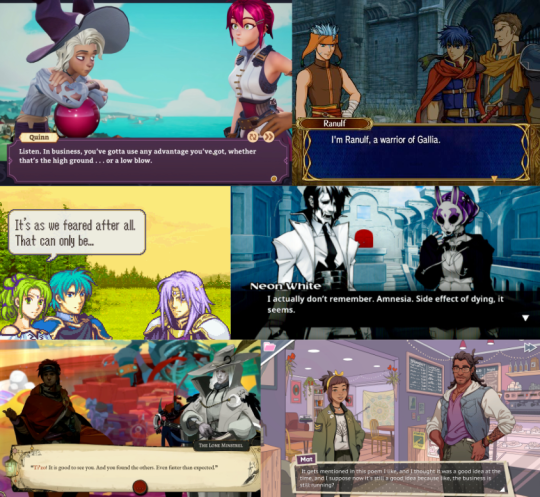
I had it ingame, and it was working. But... something felt off. Do you see the difference between every one of the above examples and this?
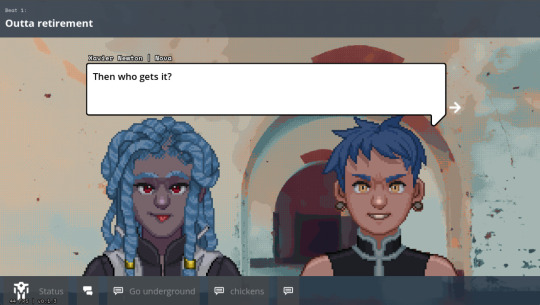
It's all about perspective, baby.
Answer: all the character art in those examples are drawn at a slight angle so they can be flipped back and forth to be made like they're looking at each other.
Trying to do this with the perspective we chose early — straight on — makes for a chorus line of weirdos who are looking directly into your soul as they ostensibly chat with each other. Credulity is strained; the illusion of these puppets interacting in the same space is paper-thin.
(I was skeptical of choosing this perspective for this reason, but we ultimately went with it to make the customizable assets in the portrait maker easier to fit together)
We tried a bunch of different layouts, but they all at least one of these problems:
they'd stare into your soul while ostensibly directing comments elsewhere.
they felt like text messages; this would be fine if that's what we were going for, but we wanted something that could represent face-to-face conversations. (Tactical Breach Wizards was able to pull this style off because they had little 3D dioramas to go along with it)
or, most damning of all, they felt like zoom calls.

So, my heart aflutter and spirit in want, I spent a day doing a research dive into various dialogue layouts (bless the Game UI Database!) to see if any other games had managed to pull this character art perspective off. I ended up with this massive non-chronological taxonomic tree:

(fullsize here)
The type of layout that particularly caught my eye was this style where each character had their own little box. These layouts borrow a concept from comic books called "closure" where the space and time between characters are left blank. Freed from the constraints of trying to simulate a single space, these layouts allow the reader to fill in the blanks with something that feels more true-to-life than anything we'd be able to render ourselves.
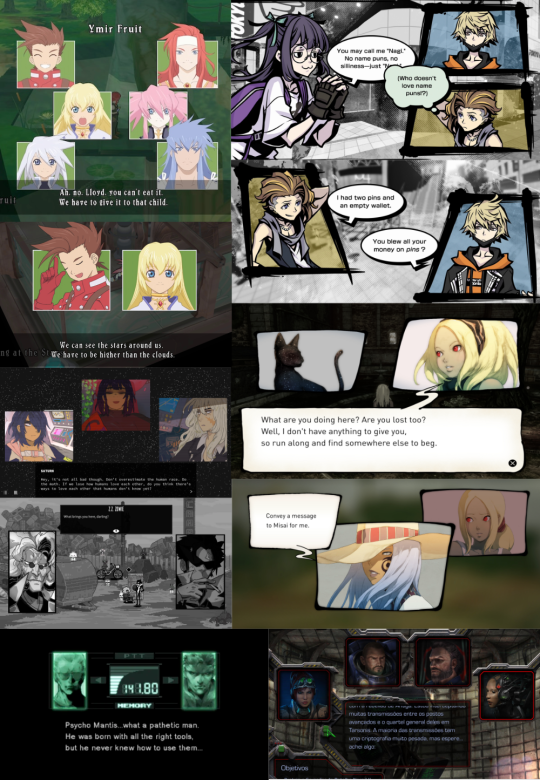
I was especially impressed with the dynamism of Tales of Symphonia and The World Ends With You; rather than sticking to single slots they would animate the entire panels moving around to indicate motion an relative position of characters.
So we threw out the old code and copied them. Here's what we've come up with:
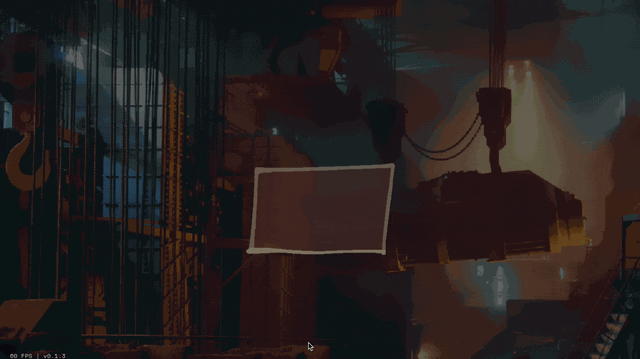
We'll be able to have portraits interact, like smacking each other (I felt like a kid hitting two action figures together, lol)

We can also apply effects like princess-leia-holograms and full-screen "lighting" effects like warning banners:

Carpenter and I came up with a number of arrangements that the portraits can smoothly transition between:

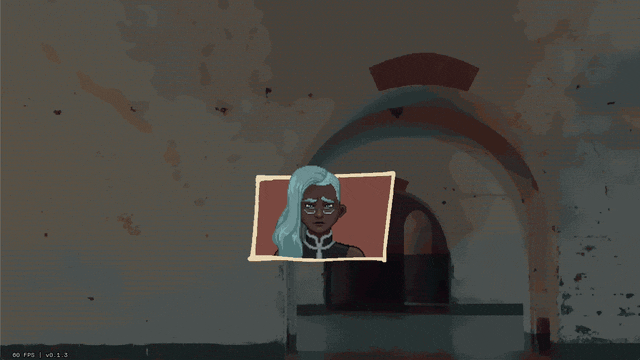
I've also implemented support for choices during a dialogue, potentially leading to branching paths.

Overall, I feel SO much better about this system than our initial designs. It might feel a little more cartoony, but I think we're making a cartoony game so that's not a problem.
Whew. We bit a lot off to chew with this project. I feel like I just made a second visual novel game engine inside of the first. Fingers crossed that it all ends up worth it.
477 notes
·
View notes
Text
Found a copy of the Interior Castle by St Teresa of Avila that advertised "removing the religious dogma from her writings" sorry but that's insane and misogynistic as hell. Teresa was a nun. Interior Castle was written for a cloistered order of nuns. Removing the "religious dogma" doesn't make sense especially in this context. Why are people so obsessed with stripping female saints of their religion? Going as far as to censor and rewrite a woman's writing because it doesn't fit your standard is disgusting.
People are so so weird about religious women. I don't know if I've ever seen the writings of a male saint be censored in this way. Trying to package this censorship as some kind of feminist move is crazy. I've seen people do this to St.Joan of Arc and St. Hildegard of Bingen. If these women were alive today we would 100% consider them conservative and they would be horrified if they saw the way people were stripping away a massive part of their lives.
Respecting women includes respecting their writings and respecting their religious beliefs. It would have been more than okay for this author to write her OWN book about her OWN takeaways from the Interior Castle. Censoring religious text is an insane way to go about it and it's why I do not like the New Age spiritual movement. That entire movement is about appropiating different religions from around the world with no respect given to them. It's more than okay to read the religious writings of someone if you're not in their religion! You don't have to change it. If the religiousity is too uncomfortable for you, there's so many wonderfully written secular books out there to read.
This hits too close to home for me, I'm a writer. If someone went in and removed the religious aspects of my short stories I would be devastated. I recognize the misogynistic history of the Church, but I also recognize that for these women, religion was the most important part of their lives. Removing that from a woman's writing suggests a lack of respect for her autonomy. It says "This woman doesn't know what she's talking about, I do!". The fact that it was another woman who did this is even more disheartening.
It's a symptom of this broader issue where people act like religious women were these passive little girls who were blindly following their priests. All 3 of the women mentioned were considered rebels in their time. Teresa was told she was being possessed and that her visions of Christ were of the devil. Hildegard was accused of being a witch because she mixed herbal and crystal healing with her faith. We all know what happened to poor Joan of Arc. Removing their religion from their story only pleases the people from their time who rejected or attempted to eject these women from Catholicism. You are doing exactly what those priests and bishops wanted.
30 notes
·
View notes
Text

A Feldkaplane
Art by Mike Franchina
Trench Clerics who fight in the Great War include a vast array of both ordained and secular fighting ministers of the Holy Word. A good example of such are the specially-trained Militärgeistliche that the Church Militant of the Free State of Prussia dispatches to counter the Heretic Legion’s Sorcerers and High Priests, who pit their faith against the fiendish Goetic Powers of the Inferno.
Due to the importance of their role, (and because of the high blood price the Heretic commanders have set for each Chaplain killed - a price which is doubled by Mammon for captured individuals as these priests are prime material in constructing the dreaded Goetic Warlocks), the Church and the Free state go to extraordinary lengths to train and equip their Chaplains with the finest weapons and armour.
In battle these Prussian Trench Clerics don thrice blessed armour crafted in the Sacrosanct Workshops beneath Köln cathedral. They are styled after the armours of a bygone age to inspire the troops, but their fuctionality is state-of-the art as they utilise the latest metallurgical innovations from the Königsberg Institute of Warfare. The location of the workshops is not without controversy, as both the Free State of Prussia and the Holy Roman Empire claims ownership of Köln. This dispute stems from the time when the Free State seceded from the Empire after holding its first democratic elections. These elections were originally instituted specifically to gain independence from the Empire, but proved immensely popular with the people and have remained in place ever since. Luckily for Prussia, the Church considers the war effort more important than petty regional squabbles, and has thus far placed the Cathedral under their care in order to keep the war production going.
The Chaplain’s superb armaments are not just limited to protection: they also carry special grenades filled with myrrh, hemlock and burning incense, as well as classified chemical substances. When detonated the shrapnel of these grenades scatters embers that rapidly burn through anything caught in the blast.
The standard issue melee weapon of the Feldkaplane are swords. Sometimes they are blades fashioned after the burning blade carried by the angel that protected the garden of Eden, while others are smaller copies of the mighty brands carried by the Paladins. Many front line Chaplains are repeatedly reprimanded by the Church for their overuse of inhaling “Holy Smoke”, a chemical compound which uses many of the same ingredients as the Martyrdom Pills. But, due to the extraordinary mental and physical toll the war takes on their minds and bodies, the practice persists even though many chaplains are lost to overdosage or have to be retired from active service due to their minds and bodies finally succumbing to the combination of stress, wounds and damage to the nervous system the Holy Smoke causes. The Great Hospice of New Antioch treats hundreds of such cases each year - withered husks of men who rarely regain their sanity. Each Chaplain carries a reliquary with them (from which their original name capellanus is derived from). The Feldkaplane depicted here, Frieherr Rainer Schwentner of the Swords of the Lord division, goes to battle with a carved wooden back piece depicting the Prussian Eagle and a reliquary said to hold a feather of the angel Uriel within it.
63 notes
·
View notes
Text
so for the uninitiated maidknights are a post apocalyptic troupe of knights dressed in armored maid dresses whose job it is to protect the princess priest, whose job it is to maintain order in the wasteland via the summoning of angels. if a princess priest refuses hypnotism by a vizier of peace, she is exiled and becomes a bastard princess. hey. pay attention, you're not getting let out of the cage until you can tell me all of the different functions of a standard issue laser halberd
39 notes
·
View notes
Text
PREQUELLE VOCABULARY
1. Feudalism – A hierarchical system where land was exchanged for military service and labor.
2. Serf – A peasant bound to a lord’s land, providing labor in exchange for protection.
3. Manor – A self-sufficient estate controlled by a lord in medieval Europe.
4. Chivalry – A medieval knightly code of conduct emphasizing honor and bravery.
5. Guild – A medieval association of craftsmen or merchants controlling trade standards.
6. Bubonic Plague – A deadly bacterial infection spread by fleas, causing the Black Death.
7. Flagellants – Religious zealots who self-punished to atone for sins during the plague.
8. Pneumonic Plague – A form of the Black Death that infected the lungs and spread via air.
9. Pandemic – A widespread outbreak of a disease across multiple regions or continents.
10. Quarantine ��� Isolation of individuals to prevent the spread of disease.
11. Inquisition – A Church-led tribunal that investigated and punished heresy.
12. Heresy – Beliefs or practices that went against official Church doctrine.
13. Auto-da-fé – A public ceremony where heretics were punished, often by execution.
14. Torture – The use of pain to extract confessions or punish accused heretics.
15. Excommunication – Official expulsion from the Church, cutting off religious rights.
16. Dominican Order – A Catholic order heavily involved in the Inquisition’s trials.
17. Reconquista – The Christian effort to reclaim Spain from Muslim rule.
18. Papal Bull – An official decree issued by the Pope.
19. Moors – Muslim inhabitants of medieval Spain and North Africa.
20. Doom Painting – Medieval artwork depicting the Last Judgment and the fate of sinners.
21. Monastery – A religious community where monks lived, worked, and prayed.
22. Abbey – A monastery or convent under the authority of an abbot or abbess.
23. Clergy – The body of people ordained for religious duties, including priests and bishops.
24. Pope – The leader of the Roman Catholic Church and the Bishop of Rome.
25. Cardinal – A high-ranking church official who advises the Pope and elects new Popes.
26. Bishop – A church official who oversees a diocese and has authority over priests.
27. Priest – A church leader who conducts religious services and administers sacraments.
28. Cathedral – A large, important church that serves as a bishop’s seat.
29. Gothic Architecture – A medieval style of church building featuring pointed arches and stained glass.
30. Tithe – A mandatory church tax, typically 10% of a person’s income.
31. Papal States – Territories in Italy controlled directly by the Pope.
32. Indulgence – A pardon sold by the Church to reduce punishment for sins.
33. Relic – A sacred object, often associated with saints, believed to have holy power.
34. Mass – The central worship service of the Catholic Church.
35. Sacrament – A religious rite, such as baptism or communion, considered sacred.
36. Monasticism – A way of life in which individuals dedicate themselves to religious service.
37. Holy Roman Empire – A multi-territorial empire in medieval Europe closely tied to the Church.
38. Canon Law – The legal system governing the Catholic Church.
39. Crusades – A series of religious wars sanctioned by the Pope to reclaim the Holy Land.
40. Simony – The buying or selling of church positions, a common practice in medieval times.
41. Yersinia pestis – The bacterium responsible for the Black Plague.
42. Plague Doctor – A physician who treated plague victims, often wearing a beaked mask.
43. Miasma Theory – The belief that diseases spread through “bad air” rather than germs.
44. Pestilence – A term for a deadly and widespread disease, often used for the plague.
45. Death Cart – A wagon used to collect and transport plague victims to mass graves.
46. Mass Grave – A large burial site for multiple plague victims.
47. Ring Around the Rosie – A nursery rhyme believed to reference the Black Plague.
48. Contagion – The transmission of disease through direct or indirect contact.
49. Plague Pit – A deep trench where bodies of plague victims were buried.
50. Hygiene – Poor sanitation in medieval cities contributed to the rapid spread of disease.
51. Trial by Ordeal – A medieval practice where accused heretics underwent painful tests to prove innocence.
52. Witch Hunt – The pursuit and persecution of individuals accused of heresy or witchcraft.
53. Edict of Faith – A public announcement by the Inquisition urging people to report heretics.
54. Relapsed Heretic – Someone accused of heresy more than once, often punished by execution.
55. Grand Inquisitor – The head of the Inquisition in a given region, overseeing trials and punishments.
56. Iron Maiden – A spiked coffin-like torture device used to impale victims.
57. Rack – A device that stretched the body, dislocating joints as a form of torture.
58. Thumbscrew – A device that crushed fingers or toes to extract confessions.
59. Heretic’s Fork – A metal rod placed between the chin and chest to prevent speech or rest.
60. The Pit – A deep, dark hole where prisoners were left to starve in isolation and despair.
#serene sun nocontext#the band ghost#serene sun spice time#serene sun mutuals#ghost band#the band ghost x reader#nameless ghouls x reader#nameless ghouls#serene sun writes#ghost band fic#prequelle
27 notes
·
View notes
Text
The risk of mysticism
The reason most people have trouble reaching the Gods is because they do not consider that whatever trouble they are having is a direct reason to what they feel that they are risking as a response.
For example, if you think yourself unworthy of Them or constantly worry that They are mad at you, it is more likely than not that you have an underlying trauma that has led to people pleasing. Deal with that first because the Gods aren’t going to make that go away - They will probably make it worse, actually.
Any issue you have in any other relationship be it with friends, relatives, lovers, you name it - the Gods will magnify those issues tenfold just by existing.
Another good example is if you are upset because you cannot hear Them clearly, consider that you have not been close enough to Them yet. And if you aren’t close enough, what can you do to make it better?
It’s not that you’re not doing enough or that you have failed. It’s because you aren’t aware enough of yourself to even begin to understand the nuance of what the Divine can offer.
The problem with people on social media who think it is a cakewalk to have a relationship with a Deity tend to steer those people who have just started out towards failure. It isn’t easy to do this - it takes work and inner reflection and dedication. You don’t go into this and think you have a right to a relationship with a God and it should just be given to you because you exist. That idea came from Christianity.
The Gods are not all-loving, omnipresent and omnibenevolent. Not all of Them even work with humans. And not all of Them care enough to go out of Their way to prove to you that They are real unless you put in your side of the effort to encourage Them to come to you. People who have 5-10 Deities they think are following them around all day don’t actually have 5-10 Deities - they are lucky if they have one.
Otherwise, if you’re okay with just giving offerings and seeing the Gods as a symbol rather than a real, living being who has needs and wants, then by all means. It just isn’t going to get you any closer to Them and a lot of people I see tend to assume They aren’t real enough of an authority to care either way.
To be clear, this is no fault of any person. This is the fault of a society that has failed in giving us a culture that allows the relevance of the Gods in ordinary to flourish.
What people don’t understand is that by walking a mystical path, you are already not going to abide by the standards of the religions that are most practiced in the modern world. What you do is not going to be what Christians or monks or nuns or priests do - it is going to be new and it is going to take effort to forge a new path into the future of paganism.
It won’t be completely from scratch but it’s also not going to have much of anything to do with Christianity no matter how much you love to hate Christians. It won’t have much to do with mainstream society at all, actually. The reality of mysticism is actually not terribly popular at all.
The people who walked closely with the gods and heard Them and felt Them always in ancient times existed outside of what was widely agreed upon to be society. It is otherwise not normal to be as close to the Gods in the way modern polytheists seem to think it should be or think it’s something everyone else is capable of doing while very few are willing to make that kind of sacrifice or risk being wrong long enough to successfully gain traction.
At the end of the day, it’s not a highly probable thing that 99.99% of people on the internet that newer people or even aged pagans compare themselves to actually have done the work to be able to claim the relationship that they believe they have with the Gods.
#polytheist#deity work#paganblr#devotional polytheism#mysticism#deity worship#norse paganism#norse gods#norse polytheism#lokean#pagan blog#polytheism#pagan resources
21 notes
·
View notes
Text
Songs that are so [Insert Character Here Coded]:
Jason Todd Edition
Millie, Warm the Kettle - Dorm Demo ~Rabbitology
"I'm tossin' turnin' in an open grave/Coined-tongued with whatever I can save/Carrying hauntings of a brand-new age—/Millie, can't you see I slide/Planchettes with my wake?"
After the Lazarus Pits, you can't say that Jason Todd doesn't feel as if he's the embodiment of "Came Back, But Came Back Wrong." After losing years of your life and piecing yourself back together amidst the LOA. When trying to establish himself in Gotham post LOA, he's effectively returning to his old haunts.
"I'm coughing up elderberry on the stage/Like your sacrificial lamb/Millie, hypnotize pain away, I beg"
When he does return to the world of the living/Gotham, he's not the same kid that he was. When he passed he was a child. So naturally not experiencing his teenage years the way you're supposed to would cause some adjustment issues and possibly affect the coping mechanisms that you think would be healthy or help at all.
Elderberries throughout history and literature have been attributed to alcohol and drunkenness, and in some runs it's pretty clear that the way that Jason manages to get his life back together is through things like drinking or putting himself in harms way. Additionally at other times when put in a situation where he can change his memory of the events in Ethiopia he doesn't shy away.
Additionally considering his canonical alternate universe where he never became Robin leads to him becoming a Catholic Priest, the religious iconography of the sacrificial lamb fits, especially since his death as Robin was a sacrifice to try to save Sheila despite her having sold Jason out to the Joker, her own son.
"I'm whisper-hissing notes on every slate/That I scribe and toss into the hungry waves/Carrying itchings for a familiar ache/Millie, can't you see I made a walking stick out of my stake?"
When Jason does come back, he is not the person that he was. In death there is no perfect preservation, its very nature is decay. One thing that he lost was some of that idealism he had, that died alongside Sheila and him. The first things to decay are the soft parts of the body, and those soft parts of him were not the priority of the Lazarus pits. They do come back eventually, but they're a scarred, more protected thing. But despite his loss of self and time lost in the worst of his pit madness he does still hold onto the things that were important to him. As Red Hood his shtick is making sure that other goons and crime lords in Gotham didn't sell to or harm kids. Or how even when his relationships with the other Robin's or Bruce himself are strained, he still will save them from certain death or team up with them for a common threat.
If he was not lucky enough to be considered worthy to be saved by someone else, damn it he'll do it himself. Yeah he's fucked up and objectively is not a fantastic person by most standards, but if he is going to be seen as a villain willing to do anything for his goals, what does he have to lose by being a villain with standards in a place where the monsters are let loose?
It's like the lady of Manderley haunted by the ghost of Rebecca; chased by Mrs. Danvers for not being the person who was there before, for not being as popular, as kind, as sweet, as lovable, as alive as the late Rebecca was in her day. But Rebecca IS dead, and she was not the saint her stained glass may depict. Now, in her place, is a young adult robbed of the chance to explore their youth and made to grow up at too young an age. Married to a life and place that killed her predecessor, she is left to gather the pieces and wear that dress that Rebecca wore, the one she is deemed 'Garish' and said to be mocking the dead by wearing the clothing picked out for her.
#Spotify#jason todd#red hood#batman#rabbitology#batfam#batfamily#It's not really batfam but sort of tangentially so for the sake of filtering I'm putting it#Anyways... I have FEELINGS on this character#One of the best robins
24 notes
·
View notes
Note
People who say Loki isn't real because there's no evidence he was worshiped are really annoying. How do I rebuttal?
By understanding this is not a proper argument to begin with.
This argument in its entirety typically goes something like this:
Loki isn't a god because he wasn't worshipped in ancient times. If he was, he would have had locations named after him (place-names), people carrying his namesake, and the presence of a cult following. Since Loki wasn't a god in pre-Christian Norse society, it would be inappropriate to consider him one now.
The origins of this argument are Asatru Folk Assembly. The full argument made by Stephen McNallen goes like this:
There was no devotion given to Loki in ancient times. No place-names marked ritual sites for him; no human bore names related to him; there were no priests or priestesses of Loki. Some modern practitioners of Asatru have apparently considered this an oversight, and one occasionally hears toasts to Loki at Asatru gatherings today. However, I strongly discourage this in the Asatru Folk assembly, and I do not permit horns to be raised to him in my presence. My experience is that Loki-toasts are followed by discord all-around bad luck.
Believe it or not, this is not a valid argument.
Logical argumentation is a kind of math, and an argument will always be invalid if it follows an invalid formula, no matter how true its predicates are.
Here's an example:
Some people are pagans, and some pagans are white nationalists. Therefore, some people are white nationalists.
This is an invalid argument because it follows an invalid formula. We can see this by reframing it:
Some people are herbivores, and some herbivores are deer. Therefore, some people are deer.
The "Loki wasn't worshipped" argument is riddled with these kinds of flaws, and not just ones that follow this particular formula. There's also issues of rocky facts, unfair standards, and general argumentative fallacies:
Heimdallr also doesn't have place-names, and is considered a god.
The absence of developed, structured cultus is not the litmus test of "worship" within the context of Old Norse religions.
The argument is predicated on the idea that the Old Norse people conceptualized "gods" the same way that the Greeks and the Romans did, in that this term applies only to high beings with widespread followings.
Same applies to how the Old Norse people conceptualized "worship." We have no idea how they defined it.
The argument's evidence does not consider all possible data, i.e. attestations found in extant Scandinavian oral traditions.
I can go on, but basically the argument is predicated on assuming the Old Norse people did polytheism according to what we think polytheism should look like.
But honestly? All of this actually doesn't matter, because the ultimate goal of this argument isn't to win the debate of whether Loki's a god or not.
It's to get people to associate "Loki's followers" with "degenerate behavior."
By painting Loki-worship as both factually incorrect AND superstitiously unlucky, it implies that anyone worshipping Loki is not right in the head somehow; that the can't think or reason correctly.
Many of Loki's followers correlate with the political and social Left. They're often queer/gnc and/or neurodivergent, and support socialist policies and rejection tradition. If worshiping Loki is deemed irrational and dangerous, then it stands to reason that these things are also irrational and dangerous, and therefore all of this must be a sign of degeneracy. Or so the argument would suggest.
The fallacies in the argument are there by design, because that is how cryptofascist writers radicalize reasonable people.
The best way you refute these arguments is to deny them a platform. Delete them from your inbox. That doesn't mean you have to ignore them though. You can always speak up about them on your own time. Personally, I try to make sure that whatever it is I bring up about them will be useful to the community at large, as opposed to being an angry hate-letter to those provoking conflict. (It's a philosophy I use regardless of what the motivations of an issue are, simply because devoting my attention to the community makes for a better online experience and is ultimately more effective in the long-run.)
312 notes
·
View notes
Text
Death Mark II thoughts
I'm like 8 months late, but I finally finished it-- and by finish, I mean I watched a playthrough.
It's been a year, but just in case: Spoilers Below
I think it's pretty significant that in order to get the true ending, Yashiki has to make it extremely clear to Sakamoto that his relationship with Michiho and Himeko is completely platonic. In fact, it seems that this is the only difference between the Good and True Ending.
In the Good Ending, he doesn't get that message through and that leads to Sakamoto pushing The Departed even harder to distance themselves from Yashiki, ultimately leading to her demise. I think this outcome happens because Sakamoto's insistence that the two girls keep their distance still expresses to The Departed that there is still a real possibility that they can get together with Yashiki. And as much as they want love and marriage, I don't think that was their ultimate desire-- and I don't think Departed!Douryou was lying when she said she disapproved of student-teacher relationships.
So then, Yashiki making Sakamoto understand that his rapport with the girls comes from concern for their safety and taking their worries seriously rather than anything else is what turns the tide. That Sakamoto allows Michiho to continue to investigate with Yashiki implicitly tells The Departed that Yashiki isn't interested-- and as such, he won't take advantage of their love (for him).
When The Departed died, their excitement for marriage and (most likely undeveloped) love for their chosen grooms were exploited by the adults they trusted. At that age, even if they later turned to feel indifferent or even hate their husbands in time, it was a time they should've been allowed to cherish those emotions. Kind of like that one reading of Romeo and Juliet, where the tragedy lies in the fact that children were not allowed to experiment with love due to the adults and the situation around them. I think this is also shown with how Departed!Douryou just wanted Yashiki to acknowledge Departed!Michiho loves him even if he can't accept it. Just because he knows that it is a love that will fade or immature, it is a real emotion to the girls experiencing it and it would be cruel to disregard it; unlike the priests who took advantage of these feelings to arrange the marriage only to ignore them once they started the ritual, if that makes sense.
(It might also be why Sakamoto later apologizing and allowing Departed!Michiho to continue investigating with Yashiki plays into her survival and the True Ending achievement: before while she was worried about keeping the girls safe from a potential predator, Yashiki has already made it clear to her before this point that he's not interested in them, but her main issue laid in how the situation could be misconstrued from an outside perspective regardless of intentions; even if she did accept that Yashiki wasn't going to go after the girls, she was largely worried about the girls' reputation and future-- as well as the school's. It's only when Yashiki makes it clear to her that his concern involves the general student population with all the "disappearances" as well as actually listening to his (temporary) students that Sakamoto relents. The priests had been preoccupied with tradition and the appearance of the brides, even the standards of choosing the grooms and brides were based on social reputation, somewhat reminiscent of Sakamoto (even if she genuinely cared for the students, it was in a way that overlooked their actual thoughts and feelings [i.e. the rising fear of The Departed or in the girls' case, wanting to be listened to]). So Yashiki's stubborn compassion and perseverance created change in the girls' environment that gave audience to their voice in a way.)
Which is all to say: The Departed truly let go of their grudge and "changed" for the better/"chose their humanity" because Yashiki had been a safe person to love-- not because he would love them back, but because he never would. The "marriage" in the True Ending then is a way for The Departed to safely live out a romantic daydream without the fear that they'll be hurt by it, as they had been when they were sacrificed. And I think it's Yashiki's adamancy on maintaining that boundary as well as making it clear to the adults around him and pushing for them to change their focus to treasure the girls' opinions that pushed The Departed to hold hopes and dreams once again, which they entrusted to the real Michiho and Himeko.
#could also be why that the bad ending is yashiki guessing the departed's identity wrong#because he was blinded by his affection for the girls and unwilling to doubt them#even if it isn't romantic affection. it is still yashiki overstepping a bit over the student-teacher/child-adult boundary#and him being unable to properly view the relationship from an outsider/more mature perspective#death mark#anyways. i thought that part of the game was nice. how they kept repeating that yashiki didn't at all see the girls like that#and how that is the key to obtaining the true ending where yashiki actually saves some students#instead of having all of them die/go 'missing'#though. i still find it so uncomfortable that they just continue having the girls crush on him#and he just fucking. lets them have coffee inside his house#like. come one... yashiki. set a stronger physical boundary...#also found it just weird how he immediately caves to leaning on high school girls for emotional support#even if he didn't know they were the departed. actually /ESPECIALLY/ since he didn't know they were the departed
25 notes
·
View notes
Text
madstone, chapter 5
“I suppose that is my name,” the former god said with a tilt of his head. “I considered changing it, but the priests advised I didn’t. Would confuse the people more than necessary, they said. I suppose they’re right.”
He put a delicate hand on Kassur’s shoulder, who suddenly felt very small and embarrassed for his outburst. “You say my name with a curious accent. Are you Velothi, by chance?”
Kassur nodded. He didn’t think his accent was that strong. Maybe Vivec was just good at picking up on it.
Without removing his hand, Vivec looked up at Ku-vastei. “What brings you to my city, Hortator?”
“Trouble with the Ahemmusa,” Ku-vastei said. She raised and jingled the Madstone in the air. “We’re helping this lad get it sorted.”
Vivec leaned his face in to examine the amulet. “Interesting design. Dwemeri, I take it.”
Ku-vastei took a closer look at the Madstone. “Is it?”
“May I?” Vivec asked, hand outstretched. Ku-vastei tentatively handed the Madstone to him. “Yes, but of very ancient make. Likely fashioned prior to a law that standardized their more utilitarian style. A law passed long before even our war with the Nords.” He smiles sadly, his eyes seeming to look beyond the amulet and into the distant past. “This really brings me back.”
Kassur managed to catch a glimpse of the amulet in the god’s hand, his first real look at it since they retrieved it. It had a round blue stone engraved with a radiant eye, cradled in an inverted crimson crescent that looked like horns.
Vivec then casually flicked the Madstone with his finger; a loud, clear tone rang out from the stone. Kassur instinctively covered his ears, even though the sound wasn’t necessarily painful.
“Before they became atheists,” Vivec began when the sound diminished, “the Dwemer feared the Daedra. They lacked their later, more complete understanding of metaphysical tonality, but still vaguely knew the importance of fundamental tones. They crafted devices such as this to ‘scare away’ the influence of the Daedra.”
“Seems the Ahemmusa somehow obtained one and used it to keep Sheogorath away for generations,” Ku-vastei filled in.
“Interesting,” Vivec mumbled, scratching his chin. “I wonder how it came into their hands. No matter, I suppose.” He looked again at Kassur. “I suspect whatever issue your tribe faces, this device is instrumental to its salvation.”
“We think so, Lord Vivec,” offered Aryon when Kassur didn’t reply.
“Oh, please,” said Vivec with a dainty wave of his golden hand. “I’m barely a ‘Lord’ anymore. Call me a saint still, if you want. But I’m more part of the common rabble these days.”
Kassur somehow doubted this. How could a god become a mortal so easily? This was, of course, assuming he was ever truly a god in the first place, something Kassur’s people readily questioned. Regardless, there seemed something insincere, or at least unbefitting, in his stated humility.
Moving right along, Vivec said, “Well, I suppose I’ll be coming with you.”
Ku-vastei barely suppressed a hiss. “That won’t be necessary, Vivec.”
“Oh, please,” Vivec said again, clasping his hands and stretching his arms in front of him. “I’m bored out of my mind here. Endless bureaucracy. And there’s only so many ways you can say, ‘Get rid of that rock in the sky.’”
He cast a glance upwards at Baar Dau, which Kassur only just now noticed. It was indeed a giant rock in the sky, crawling with miners like kwama, bits of excavated stone falling into the water by the Temple canton.
“Won’t leaving the city put its stasis in jeopardy?” Ku-vastei asked.
“No, I can handle it from afar well enough, especially seeing as it’s quite a bit lighter these days.”
Ku-vastei swished her tail and scratched her chin. Finally, she acquiesced. “Fine. You can come. But not like that.” She made a gesture with her metal hand, dividing her face into two halves.
“Of course,” Vivec replied. “I can be discrete.” In an instant the gold faded from his right side, leaving him fully grey, like any other Dunmer. “Completely inconspicuous.”
“Fine,” Ku-vastei grunted. “Just don’t make any kind of scene. This doesn’t have to be a big ordeal.”
“As you wish, Hortator,” Vivec answered. Kassur was amazed by how easily Ku-vastei commanded the (former) god, and how readily he submitted to her whims.
“Let’s be on our way then, shall we?” asked Aryon. “We’ve got the better part of the island to cross.”
Ku-vastei shrugged. “We’ll just teleport to Sadrith Mora, take the boat to Vos, then walk the rest of the way to Ald Daedroth. Not too complicated.”
- - -
And it wasn’t too complicated. The teleport to Sadrith Mora (which Kassur handled even better than the last three, getting quite used to it), the walk across town, and boat ride to Vos, were mostly uneventful. But it was far from boring, as you might imagine, being a trip with a powerful wizard, the leader of a nation, and a god. To Kassur it went by in a blur; either Aryon and Vivec were in heated debate about the Dwarves, which Ku-vastei moderated, or the three discussed political matters so far over Kassur’s head in their import that he simply tuned it out and focused on not getting seasick. Gals Arethi kept a baleful eye on Kassur, but apparently the esteemed company Kassur traveled with kept him safe from the shipmaster’s wrath.
When they arrived, Sedyni the Vos shipmaster was not there. The four travelers stepped off the boat and glanced around. The nearby tradehouse seemed unusually quiet. Gals shrugged and sailed off back to Sadrith Mora.
“Where is everyone?” Kassur asked. At this time of early evening, the village was usually buzzing with activity.
Vivec closed his eyes. “The chapel is empty.”
“How could you possibly know that?” asked Ku-vastei, planting a metal hand on her hip. Kassur wondered about that brass gauntlet she wore – it was incredibly ornate, and had an air of being impossibly ancient and powerful. But he had no idea how to ask politely.
“I can still feel it,” Vivec said, opening his eyes again. “Most people still revere me as a god, especially this far removed from the official temple in my city. So the Tribunal holy places are still attuned to me.” Kassur had no idea what he was talking about.
Aryon was oddly quiet. In the short time Kassur had known him, he’d never acted like this; he was the type of consequential mer to always have something to contribute to a conversation. It was barely perceptible, but Kassur could swear he saw a slight tremor in Aryon’s hands. But Kassur couldn’t tell if it was fear…or rage.
“Aryon?” asked Ku-vastei. “Are you alright?” She seemed to notice the same thing Kassur had.
“Check on the village,” Aryon said, his voice dry. “I go to the tower.” And so he did, flying off fast through the air, much faster than they had in Vivec. As Kassur watched him disappear into the sky, he saw a dark cloud in front of the setting sun. Or…was it a pillar of smoke?
“This bodes ill,” Vivec said, frowning. “Kassur, stay close. It’s quiet, but I suspect danger.”
Kassur felt a sudden pang of guilt. He realized he was more like a liability to these powerful beings, someone they had to keep close and protected because he was so weak and helpless. He could barely conjure a flame, and didn’t know how to use a weapon. In a fight, he was worthless. He began to wonder why they’d brought him along at all. A sneaking suspicion told him they thought he would be useful only as a bargaining chip, of sorts. A sort of intermediary to help them accomplish…whatever grim task they meant to do.
The thought escaped his lips just as he thought it. “Don’t kill them,” he blurted. “If it is the Ahemmusa. Please.”
“Kassur…” Ku-vastei began, turning to face him. “That might not be –”
“You have our word,” Vivec interrupted, placing a delicate hand on Kassur’s shoulder. “No excessive harm shall come to your people.”
Ku-vastei scoffed, snapping her head towards Vivec to glare at him, but after a moment sighed and shrugged. Kassur wasn't sure if he could trust the word of the false god – or if the Nerevarine had any interest in going along with him.
They proceeded towards the town walls, which were actually the backs of the tightly-crowded huts of the village, no space left between their rounded stucco corners. There were no guards posted at the gate, the town’s single entrance, and beyond them was still silent. Down the single street they could see that many of the doors were half-to-wide open, but there were no obvious signs of a struggle.
“Vivec,” said Ku-vastei, “take Kassur to check the chapel. I’ll check on the houses.” Vivec nodded and gently directed Kassur towards the chapel as Ku-vastei began picking her way from hut to hut.
Vivec and Kassur passed under the chapel gate into the meager courtyard. The small alchemical garden the two priests maintained there was not overgrown or choked with weeds. “They haven’t been gone long,” Kassur observed out loud.
Vivec noticed Kassur examining the garden and nodded. “Good,” he said, smiling at Kassur. “Let’s check inside.”
The door was closed, and unlocked. But the chapel never locked its doors, not even when the priests were both asleep. Vivec cautiously pushed through the threshold, Kassur following close behind. “Hello?” called out Vivec. “It’s alright. We’re here to help.”
There was no answer. The chamber within was nearly pitch-dark, only faint light coming through the stained glass domed ceiling. Vivec cast a Light spell for them to see by as they entered.
It was a mess. The Tribunal tapestries on the walls were torn to shreds, and the murals defaced with what Kassur hoped was paint; candles and torches were snuffed out; the prayer-stools were upturned and thrown about; loose ripped-out pages of books were fluttering in the breeze visiting from outside; ash and bones from the circular Waiting Door on the floor were spread across the room haphazardly. Kassur held no great faith in these things, but it still pained him to see such desecration of a holy place.
“Be on your guard,” said Vivec stiffly. “In this state I fear I could not trust my divinity to tell if we’re alone. There is little holiness left here.”
Kassur’s muscles tightened. He still didn’t understand how Vivec could know such things. But if he truly was anything close to what he claimed – an ancient mortal-made-god, a living deity – then it was difficult to doubt him.
They slowly circled the Waiting Door, more carefully inspecting the scene, but there was no more evidence of exactly what had happened. At least there’s no blood, Kassur thought. He remembered his teacher, Yakin Bael, and said, “There’s a bedroom downstairs. We should probably check there, too.”
Vivec nodded in agreement, and led the way down the steps, his orb of magical light guiding the way. The priests’ bedroom was not saved from the sacking: pots and urns of various alchemical and cooking ingredients were overturned and cracked open; broken glass from shattered bottles littered the rug underfoot (Kassur was for once glad for his shoes, and Vivec hovered an inch above the ground); the desk had its drawers yanked out, scattering torn papers and writing implements, and its stool and tall candlestick were toppled; the privacy screen was ripped open; and the beds were torn apart, sheets and blankets strewn and split.
Vivec stopped to inspect some of the loose pages of sermons and notes on the floor. Kassur went up the short ramp to the beds to look more closely. He knew the bed on the left was Yakin’s – they had a few lessons down here, when the upstairs chapel was too busy and loud. He picked up a pillow from the floor, gashed open and spitting up dried wickwheat stuffing, and gently laid it back on the head of the bed. He knelt down, and quickly realized that under the pillow was Yakin’s spectacles, broken and bent at the nose and lenses shattered. He gently took them in his hands, careful of the jagged edges of glass, and stared at them.
Just as he was getting used to his new life in Vos, now it seemed to be ripped from him again. Even the only real friend he had among the housemer, his teacher Yakin Bael, seemed to be in some unknown peril. And, useless as always, Kassur could do nothing but follow along with the real heroes, who actually had power to do anything about it.
“Here,” said Vivec, startling Kassur from his misery. A second orb of light appeared, floating near Kassur by the beds.
“Thanks,” said Kassur. Vivec smiled and kept reading a document in his hand.
Kassur looked back down, and something immediately caught his eye. Just under the edge of the bed was a bright gleam, reflecting the magical light above. Kassur slowly reached for the shining object and pulled it out.
It was a short sword, still in its sheath; its metallic hilt had been catching the light. He removed the sheath noiselessly and beheld the glistening steel blade, sharp as the day it was forged. “Vivec,” he called, “he had a sword. Yakin, that is. And he didn’t use it.”
Vivec dropped what he was reading and floated up the ramp to Kassur, looking down at him and the sword. “Hm,” he pondered, tucking his legs up under him as he floated and placing his hands on his crossed knees. “Doesn’t mean there wasn’t a struggle. Those spectacles are broken. No blood?”
Kassur looked around again. On a whim he grabbed the pillow he had adjusted earlier and turned it over; sure enough, a small bloodstain seeped through the cloth case.
“Punched in the face,” Kassur suggested. “Nose bled, maybe broken. No other signs of a struggle, that I can tell.”
“Fair analysis,” Vivec said. “I don’t think there’s any other clues here. Let’s go meet up with Ku-vastei.”
Ku-vastei had just come back from the end of the street to the chapel by the time Kassur and Vivec came out. She was alone.
“I see you didn’t find any survivors,” Vivec said, frowning. “Any dead?”
“No,” Ku-vastei said. “No sign of any struggle. Everyone is just gone. What of the chapel?”
“We found no one, but the chapel was desecrated. The homes were untouched?”
“That I could tell, yes. Some doors were left open, and the breeze disturbed some belongings, but that was it.”
“Hm,” Vivec said, stroking his solid grey chin. “Perhaps they’re sheltering at the tower?”
All three turned west towards Tel Vos. The pillar of smoke was rising higher, and blacker. Without a word they began at a quick pace towards it.
- - -
Aryon had put out most of the flames by the time they arrived, but the damage had been done. There was nothing left of the Telvanni fungal roots of the tower but ash, even Aryon’s personal pod at its peak. The tendrils which had so integrated themselves into the stonework of the Imperial fort no longer held it up, causing several portions to collapse into charred bricks.
Ku-vastei and Vivec readied their spears (Kassur hadn’t noticed the god had been carrying one until now) while Kassur cowered behind the two. But it made him feel like a coward, so he tried his best to straighten his back, puff out his chest bravely, and at least put his hand on the sheathed sword of Yakin Bael, even if he didn't have the nerve to actually draw it.
Aryon knelt in front of a smoldering pile of bodies. It was hard for Kassur to make out in the carnage, but it seemed like a mix of guards, tower servants, and Ahemmusa raiders. He might have recognized some of the latter, if they weren’t all so horrifically burned.
“Master Aryon?” asked Vivec. “Are you harmed?”
Aryon turned his head slowly. There was no evidence of weeping on his face, but he looked like a man completely exhausted. Kassur understood the feeling immediately. “No,” Aryon said. “They likely went north before I arrived.” He stood and wiped his hands on his robes. “To the old camp. What of Vos?”
He’s held together by a thread right now, thought Kassur. There was a haunted look in his eyes. He’d just lost everything. Kassur could relate – although he’d ran from his old life, instead of having it torn from him.
“There was no one there,” Ku-vastei said. “No sign of a struggle, except that the chapel was ransacked.” She took a cautious step forward towards Aryon. “Are you sure you’re –”
The wind changed suddenly, and Kassur caught a big whiff of the corpse-smoke. He gagged loudly, covered his mouth with the collar of his robes, and fled towards a nearby wall. He planted his free hand against the stone as he tried to calm his retching before it grew into something worse. He could feel three pairs of eyes on his back, and he resented it. He let go of the wall and looked at his hand; it was completely covered in soot. The wall now had a relatively clean handprint on it where he’d stolen the blackness. “I’m fine,” he shouted, although the act nearly made him gag again. “I’m –”
There was a loud crack somewhere above him. He only had time to look up at the top half of a tower rushing towards him, but not enough to move out of the way. He closed his eyes.
Something hit him hard, but not at the angle he was expecting. The collapse was deafening, its roar of crumbling stone erasing all other sounds. When the sound had settled, Kassur opened his eyes. Ku-vastei had him in her arms; he could feel the cold metal of her right hand pressing into his spine through his robes.
Vivec and Aryon appeared in the air above them, their feet glowing with pink light. “Are you two alright?” Aryon asked.
Kassur felt a soothing energy enter his body from the gauntlet, and he felt less sore from the tackle. “Yes,” Ku-vastei said as she stood up, lifting Kassur with her. “I’m fine, and he will be.”
Kassur caught a glimpse of Aryon’s face, wrinkled with worry, before it relaxed into relief. Then he put on a new mask, a mask of cold wrath. A cascade of facades to make Mephala proud.
“Good,” Aryon asked. “We need to go to the old camp and see if they’ve taken the citizens there.”
Aryon turned, and with a mystical wave of his hand, buoyed up the rubble in mauve smoke and flung it aside. “Come,” he said once the crashing din faded. “We have work to do.”
Suddenly, Kassur was terrified of Aryon – and for the safety of his own people.
26 notes
·
View notes
Note
Hey, I just got done reading your amazing write up about Nanaya. I honestly didn’t expect to find the best information yet on Tumblr! I did have one question though: given that Nanaya was heavily influenced by Inanna/Ishtar, do we have any information concerning whether her cult had similarly third gender/gender non-conforming parts of its clergy?
Gala (Akkadian kalû) are mentioned among Nanaya's clergy in Kish (during the reign of Ammi-ditana; Drenowska-Rymarz, The Mesopotamian Goddess Nanaya, p. 67), in Larsa (during the reign of Rim-Sin I; p. 69), and in Uruk (historical note in an inscription of Simbar-Shipak from Nippur; p. 70). Pretty sure only Borsippa is missing out of her major cult centers. Given that the evidence pertaining to clergy of Nanaya is relatively sparse overall, especially before the first millennium BCE, it seems safe to say it was a fairly common phenomenon. However, as gala were by no means "priests of Inanna" as commonly incorrectly claimed online, and their much debated gender identity had nothing to do with Inanna (as they also occur in the cults of deities who were essentially paragons of gender conformity; plus even when ambiguity occurs in the case of Inanna, it's not really making her identity gala-like... in fact, other than Lumha no deity is really described as a gala - and Lumha was essentially a personification of the profession), I feel the question is a bit misguided. Gala were professional lamenters, and not really any less common than ritual purificators or temple scribes. Any deity major enough to have multiple types of specialists attached to their temples had gala. They were a core part of the religious landscape of Mesopotamia basically to the same degree as the āšipu, and by the first millennium BCE these two specialized priestly professions are in fact often mentioned side by side (Uri Gabbay, The kalû Priest and kalûtu Literature in Assyria, p. 116). With that in mind, it's safe to assume the presence of gala in the cult of Nanaya has nothing to do with association with Inanna, all it shows is that she was worshiped commonly enough to warrant the existence of multiple types of clergy in multiple cities. To further demonstrate that gala were a class of clergy like any other as opposed to "priests of Inanna": Ninurta's cult involved gala (Wolfgang Heimpel, Balang Gods, p. 583; "chief gala" mentioned among the staff of Eshumesha in Nippur alongside a "chief singer"), as did Ninazu's (Paul-Alain Beauieu, Remarks on Theophoric Names in the Late Babylonian Archives from Ur, p. 170; influential enough for the name to be spelled in emesal as standard in late sources), or Nanshe's (Gebhard J. Selz, Untersuchungen zur Götterwelt des altsumerischen Staates von Lagaš, p. 205-206 discusses members of Nanshe's clergy in ED Lagash); even the late invention of an "antiquarian" cult of Anu involved gala (Julia Krul, The Revival of the Anu Cult and the Nocturnal Fire Ceremony at Late Babylonian Uruk, p. 31), the examples keep piling up. It's also worth noting even the arts of the gala were believed to be an invention of Ea (Uri Gabbay, The kalû Priest and kalûtu Literature in Assyria, p. 116), same as most other professions. I think connecting Inanna's gender nonconformity (which occurs primarily in association with her military role) or occasional ambiguity (which is best attested in astronomical context) with the presence of gala in her cult is an issue in itself (even without going into the mess that is the common trend of connecting gala with the sexual aspect of Inanna specifically, for no particularly strong reason) but I will cover these matters (and more) in a separate long post soon.
23 notes
·
View notes
Text
By: Ian Golan
Published: Jun 5, 2024
There’s a modern Christian custom to include a reference to a Bible verse in Twitter bios, Instagram descriptions, and even Tinder profiles. Whenever I encounter this, for whatever reason, I feel compelled to check the actual passage. I open an online Bible and enter the numerical code into the search engine. I want to know: Which sentence from God changed their life so monumentally that they chose to highlight it on social media?
Every single time, without fail, I’m disappointed by the verse I find.
Though the urge to share a favorite biblical passage doesn’t seem to be a coordinated effort, some sort of herd instinct must be at play. Almost all of them come down to just a few quotes repeated endlessly across platforms. These popular verses are remarkably unimpressive. Even when an uncommon passage is chosen, it tends to be unremarkable. This issue is not limited to social media; whenever I encounter Christians, I am baffled by the portions of the Bible they consider worth sharing with an unconvinced audience.
While the Bible is often revered, it is also, quite frankly, boring. At least, the parts that believers are comfortable sharing are. I’ve yet to encounter a Christian proudly quoting verses that command, for example: “One shall not suffer a witch to live,” or describe God sending bears to kill children who mocked his prophet for being bald, or depict the gruesome massacre of Egypt’s firstborn by the angel of death.
The Book of Boredom
The books of Proverbs, Psalms, and most of the Epistles are utterly uninteresting in terms of moralistic conclusions for our lives. They are intriguing when one delves into issues of their authenticity, the early Christian infighting between Paul and Peter, or the evolution of theological views away from Jesus’ teachings. However, in terms of inspirational content, they fall short compared to other religious texts and are inferior to many ancient or later philosophers.
To play the devil’s advocate, the impact of the Bible on European and American culture may have stripped it of its novelty and meaning, making its ethics seem obvious to Western readers. However, even with this consideration, the Bible still falls short. I cannot imagine seeking advice on how to live my life from the Bible, not because of my anti-theist bias, but simply because the content is inadequate.
As a practicing teenage Catholic, I forced myself to study the Bible through strict self-control. I knew it was important to know the book sent by God, but I was always unimpressed. The priest’s long-winded instructions based on the passages never resonated with me. Today, I barely remember any of the teachings. I don’t think I was an anomaly among churchgoers, but the norm. An honest introspection by Christians would likely reveal that biblical passages are neither momentous nor significant to their ethical decisions.
The Omniwriter
This observation is devastating to supernatural claims about the Bible. As a writer, albeit maybe a mediocre one, I do not excuse bad writing, not even for divine beings. Given enough time, I could significantly improve any piece of writing, choosing words precisely to convey my intent perfectly. Imagine the intricate plot crafted with unlimited hours of thought, telling the most engaging story ever. This is what we should expect from God the Omniwriter.
If God embarked on the task of crafting a text to communicate his will perfectly to humanity, it would be the best book in history. Every page would be a masterpiece, worth endless hours of study. The perfection of the text itself would argue for a supernatural creator capable of such literary supremacy. This is the standard we should hold every Christian apologist to when they claim the greatness of the Bible. This is the book we should expect under the Christian worldview, but it is certainly not the Bible.
The Missing Awe
Think of the most intense feeling you’ve had while reading a book—perhaps the sense of dread for the fellowship of the ring in Tolkien’s novel or the awe at a philosopher’s observation. Have you ever felt such intense emotion reading the Bible? Have you had sleepless nights because you couldn’t put it down? I’ve had such experiences with many books, but never with the Bible. I never fell asleep with my head on the Bible, captivated by its text.
My experience is clear, and I guess yours might be similar. A major reason for this guess is the widespread ignorance of the Bible among Christians. The fact that I can fluster them with well-chosen passages that contradict their moral intuitions or established Christian myths shows that the Bible is not as great as claimed. Believers struggle to stay captivated by the Bible, a struggle that should not exist. Believers of a religion with a sacred script from an omniwriter would be such vehement scholars of this book that no atheist attack could succeed.
However, the Bible is so lackluster that it can even lead to deconversion. Penn Jillette, in the episode “The Bible: Fact or Fiction?” of Penn & Teller: Bullshit!, said:
“Take some time and put the Bible on your summer reading list. Try and stick with it cover to cover. Not because it teaches history; we’ve shown you it doesn’t. Read it because you’ll see for yourself what the Bible is all about. It sure isn’t great literature. If it were published as fiction, no reviewer would give it a passing grade. There are some vivid scenes and some quotable phrases, but there’s no plot, no structure, there’s a tremendous amount of filler, and the characters are painfully one-dimensional. Whatever you do, don’t read the Bible for a moral code: it advocates prejudice, cruelty, superstition, and murder. Read it because we need more atheists—and nothing will get you there faster than reading the damn Bible.”
While atheists probably shouldn’t start giving out pocket Bibles to deconvert believers, the inadequacies of the Bible are a strong argument against its supernatural origin.
==
Even Xians don't believe the bible is as great as they pretend it to be. If they did, they'd have all read it, multiple times. They wouldn't be able to put it down because it's their magical space wizard talking to them through his prophets.
2 Peter 1:20-21
Knowing this first, that no prophecy of the scripture is of any private interpretation. For the prophecy came not in old time by the will of man: but holy men of God spake as they were moved by the Holy Ghost.
You know, except when it's a forgery. Or a metaphor. Or no longer applies.
They haven't.
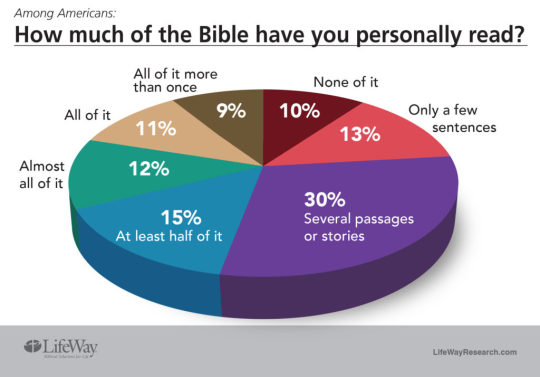
13 notes
·
View notes